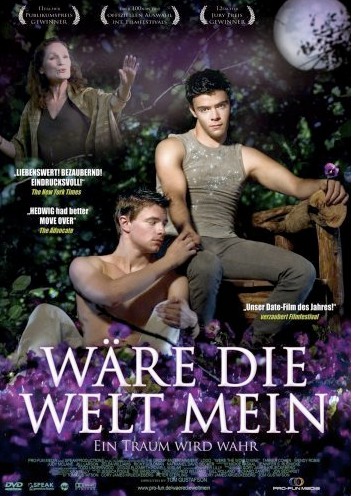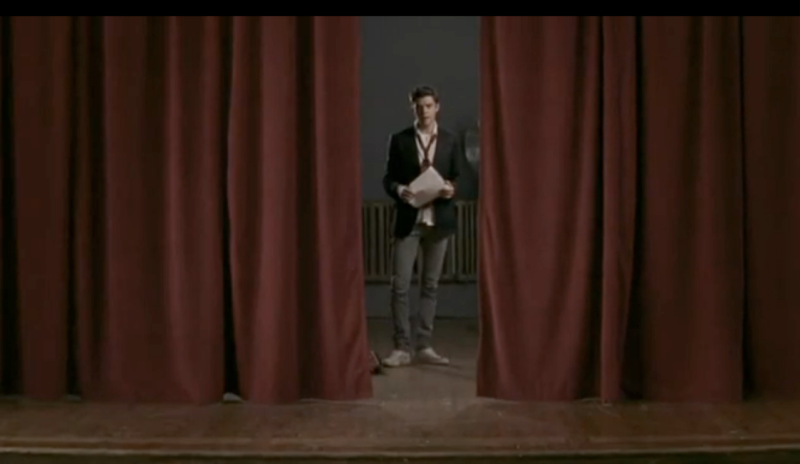If you can't tell from this video that this is practically the best movie ever made, I should emphasize that it's not "fabulous." I think they tried to market it that way because one of the posters features Tanner Cohen making a dramatic facial expression on top of what I think is a marquee. I really prefer this poster, which better evokes how sad and weird the movie is:

To me the word "fabulous" means something where feminine gay men are used as a joke or a harmless spectacle, and not treated as real people. This isn't the case in Were the World Mine at all. Timothy is a passive but angry character, and the fantasy in the above video isn't harmless at all; in context, it's actually rather mean-spirited and bitter. Timothy casts the jocks he loathes as the comically swishy backup dancers in his fantasies, making them caricatures of the mannerisms and identity they bully him for having. When he calls the demasculinized jocks "fairies" it's not supposed to be a quirky pun; it's an assertion of the dominance he doesn't have in real life.
He ends up getting it in real life, though; about an hour into the movie, Timothy is looking through an old edition of A Midsummer Night's Dream, which is being performed as a musical at his school, when he finds a recipe for the love spell used in the play. After following the directions, he produces a flower that squirts juice onto people's eyes and makes them fall in love with the first person they see. Timothy uses it to make Jonathan, the guy he likes, fall in love with him, but when people react negatively to their relationship, Timothy gets pissed off and makes all the homophobic people he knows fall in love with someone of the same sex.
This causes trouble because people get attacked for being gay, especially because the spell makes them really dopey and prone to public displays of affection. Also, Timothy only has two friends, a boy and a really annoying girl who have a crush on each other, and he accidentally made the boy fall in love with him. Timothy's drama teacher, who's implied to be a lesbian and some sort of magical being, is the only person who knows what's going on. She eventually convinces Timothy that what he's doing is wrong, and he reluctantly undoes the spell. This sounds like it might be depressing, but a)for some reason the spell has made it so no one is homophobic anymore, and b)it turns out Jonathan was actually gay in the first place.
I didn't mind Jonathan being gay--it had been sort of set up the whole time--but I thought it was cheesy that everyone stopped being homophobic. Also the homophobia was really cheesy in general; there's more than one scene in the movie where someone dourly turns to Timothy's mom and says, "Your son is a homosexual?" I don't really think these aspects of the movie are a huge deal, though, and I'm puzzled that I've seen reviews describing the movie as really awful in parts and good in others. I'd say it's mostly awesome and the weaknesses don't detract that much from how good it is.
This one clip that I keep watching over and over is the scene where Timothy auditions for the musical. He starts out singing nervously, but his confidence builds thanks to the encouragement of the ambiguously gay, ambiguously magical drama teacher; then, halfway through, the scene transforms into a blue-tinged fantasy sequence where Jonathan and Timothy walk through the halls with the jocks lurking creepily in the background.
The transition starts when Jonathan hears Timothy and the teacher singing, and peers into the room. We know from earlier shots that Timothy is standing next to the drama teacher, who is playing the piano. But from Jonathan's perspective, we see this:

In the same moment, Timothy begins to sing by himself: "We fairies that do run/From the presence of the sun/We follow darkness/Like a dream." This moment just about breaks my heart--the ache in his voice when he says "fairies," the fact that there is no "we fairies" because he doesn't know anyone gay except himself, the surprising accuracy of the lyrics when applied to gay people, especially gay kids; but largely the shot, in which Timothy is looking very cool but also very small, talented but alone.

"Fabulous" -> fabulae (Latin?) - fable or fairy tale.
ReplyDelete(It probably has a double entendre in there somewhere).
And the music clip was great.
I also liked that movie, though I agree about the over-the-top homophobia was sort of odd.
ReplyDeleteAlso! The guy who played the male best friend is in my German class.